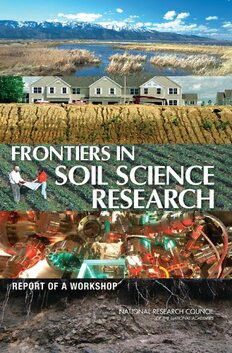
Frontiers in Soil Science Research: Report of a Workshop PDF
81 Pages·2009·0.716 MB·English
Most books are stored in the elastic cloud where traffic is expensive. For this reason, we have a limit on daily download.
Preview Frontiers in Soil Science Research: Report of a Workshop
Description:
There has been renewed interest in soil and soil science in recent years as the recognition that biogeochemical processes that occur at the Earth's surface influence global climate change, land degradation and remediation, the fate and transport of nutrients and contaminants, soil and water conservation, soil and water quality, food sufficiency and safety, and many other issues pertinent to the stewardship and conservation of land and water resources. In some areas of the Earth we have approached near irreversible soil conditions that may threaten the existence of future generations. Understanding the long-term implications of decreased soil quality and addressing the aforementioned challenges will require new information based on advances and breakthroughs in soil science research that need to be effectively communicated to stakeholders, policy makers, and the general public. On December 12-14, 2005, the National Academies convened the Frontiers in Soil Science Research Workshop, summarized in this volume, to identify emerging areas for research in soil science by addressing the interaction of soil science subdisciplines, collaborative research with other disciplines, and the use of new technologies in research. The workshop focused around seven key questions addressing research frontiers for the individual soil science disciplines, and also addressing the need for integration across soil science with other disciplines.
See more
The list of books you might like
Most books are stored in the elastic cloud where traffic is expensive. For this reason, we have a limit on daily download.
